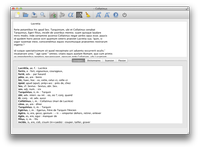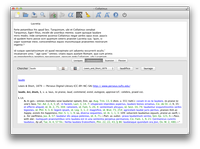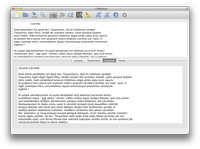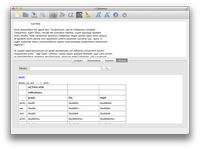Presentation
Collatinus is a free multi-OS (Mac, Windows, Ubuntu and Debian GNU/Linux) and open source application that is easy to install and use.
Collatinus is both a lemmatiser and a morphological analyser for Latin texts: if a conjugated or declined form of a word is entered, it is capable of finding the correct root word to search for in the dictionary and then displaying its translation into another language, its different meanings, and any other information usually found in dictionaries.
In practice, Collatinus will be useful mostly for Latin teachers and professors who can quickly generate a complete lexical aid for any text and distribute it to their students. Students often use Collatinus as a reference when reading Latin texts, as they develop their vocabulary and language skills.
Main Features
- lemmatise a Latin word or a full Latin text
- translate lemmas using the Latin dictionaries included in the application
- display syllable quantities (long and short syllables) and inflection (declension and conjugation)
Help
Read the help pages (in French)
Advantages of Collatinus
- efficiency of the lemmatization process (~1000 words/s. ; depends of course on the machine on which the program is running),
- lemmas from Lewis & Short 1879 and Gaffiot 2016 (with the author's permission) with translations into English and French. Collation with those from Georges 1913 and Jeanneau 2017 (with the author's permission),
- basic glossary of 24,155 lemmas (Classic texts from LASLA) and extension of 58,384 lemmas, with some additional variants and the assimilation of the prefix,
- classification of the lemmatizations and morphosyntactic analysis according to the number of occurrences observed in LASLA texts,
- translations of about 11,000 lemmas in 6 different languages, other than French and English (to be improved)
- ability to colourize a text according to a list of known words,
- scansion and accentuation of a word or text,
- probabilistic tagger based on statistics from LASLA texts (~1,800,000 words)
- access to dictionaries in text or image mode (djvu). Easy to add new dicos (djvu),
- ability to use Collatinus from another program (e.g. LibreOffice) via an internal port,
- ability to query Collatinus from a client in console mode. Lemmatization of a text from a file
- software source code refactored in a modular way in order to facilitate the development of more specific applications
Project History
Originally, Collatinus was meant to produce printed documents, and it is still used for this purpose. Further improvements and adjustments were made when it became apparent that many people were using it for other purposes:
- as a lexical and morphological reference when reading a Latin text disposer,
- for lexical and stylistic searches
- to provide students with exercises based on Latin texts
How it Works
Unlike the majority of lemmatisers, which use lists of inflected forms, Collatinus uses a lexicon containing the lemmas and all the necessary information for their inflection. The advantage to this approach is that Collatinus, with its 11,000 lemmas, is capable of recognising over half a million forms. Adding lemmas with spelling variants (such as medieval spellings, for example) would make it possible to recognise all of their inflected forms as well.
Starting from a lemma and its associated flexional endings, Collatinus is also capable of displaying the corresponding inflection tables, which Latin learners may find useful.
Finally, when syllable quantities are known for a given lemma, Collatinus can scan the word and even the entire text. When scanning a text, Collatinus applies the usual rules of elision and hiatus.
News
The current version of Collatinus, 11.2, comes with some new features, improvements and bug fixes:
- ability to export the results of a lemmatisation or tagging process as CSV
- recovery of 13 000 english translations
- documentation of the server-side application of Collatinus (in French only)
- Collatinus now takes into account non-Latin alphabets in a different alphabetical order, including those with digrams, for the consultation of dictionaries in Djvu format (for example if you want to add a dictionary Czech-Latin). Ability to take into account characters of the same rank, for instance ph=f et y=i (in Djvu).
- bugs fixes:
- the english version is now fully available
- lemmatisation and translation of words that are supposed to be known (during the colorization of a text) are not given anymore. It is possible to get the number of occurrences of known words.
The previous version of Collatinus (11 bêta) added a lot of new features:
- "complete" lexicon (82 000 entries)
- ordering of the solutions depending on frequencies
- inclusion of the Gaffiot 2016 Latin-French dictionary
- ability to display two pages of dictionary (synchronized or not)
- simpler dictionary installation
- marking of accent and hyphenation of the text
- ability to color a text depending on a list of known words
- probabilistic tagger to find the "most probable" lemmatisation
- internal server to use Collatinus from the command line or, for instance, to scan a text without leaving the text editor.
Screenshots
Downloads
There are three versions of Collatinus available (customisable). The difference is the number of pre-installed dictionaries that come with the application:
- full (9 dictionaries)
- medium (5 dictionaries)
- light (2 dictionaries)
These versions can be completed at any time by downloading one or more of the dictionaries listed below and by installing them from the Extra menu in Collatinus.
Dictionaries
The following dictionaries are compatible with Collatinus version 11 and higher.
In text mode:
- Gaffiot 2016 (15 Mo — latin-french)
- Jeanneau 2017 (12 Mo — latin-french)
- K. E. Georges 1913 (16 Mo — latin-german)
- Lewis & Short 1879 (22 Mo — latin-english)
- Du Cange 1883 (58 Mo — glossary of medieval latin)
- Köbler 2010 (34 Mo — medieval latin-german) New
- Ramminger 2020 (9 Mo — neolatin-german) New
In image mode:
- Calonghi 1898 (62 Mo — latin-italian)
- De Miguel 1867 (153 Mo — latin-spanish)
- Faria 1975 (171 Mo — latin-portuguese) New
- Gaffiot 1934 (101 Mo — latin-french)
- Nöel 1851 (218 Mo — latin-french)
- Valbuena 1819 (86 Mo — latin-spanish)
- Lebaigue 1921 (223 Mo — latin-french)
- Quicherat 1836 (303 Mo — prosodic french)
- Franklin 1875 (17 Mo — proper nouns)
- Noël 1824 (21 Mo — etymology of proper nouns)
Collatinus 11.2 (current version)
Full version
(9 dictionaries included)
- Lewis & Short, 1879 (latin-english)
- Gaffiot, 2016 (latin-french)
- Du Cange, 1883 (medieval latin glossary)
- Georges, 1913 (latin-german)
- Jeanneau, 2017 (latin-french)
- Gaffiot, 1934 (latin-french)
- Calonghi, 1898 (latin-italian)
- Valbuena, 1819 (latin-spanish)
- Quicherat, 1836 (latin-french)
Medium version
(5 dictionaries included)
- Lewis & Short, 1879 (latin-english)
- Gaffiot, 2016 (latin-french)
- Du Cange, 1883 (medieval latin glossary)
- Georges, 1913 (latin-german)
- Jeanneau, 2017 (latin-french)
Light version
(2 dictionaries included)
- Lewis & Short, 1879 (latin-english)
- Gaffiot, 2016 (latin-french)
Sources
All versions (by operating system)
| Mac OS | Windows (32 bits) | Windows (64 bits) | GNU/Linux | |
|---|---|---|---|---|
| Full version |
Ubuntu package |
|||
| Medium version | ||||
| Light version |
FAQ
Apologies, the FAQ is only available in French.
Crédits
Collatinus is developed and maintained Yves Ouvrard, with the valuable support of Philippe Verkerk
It is available under the GNU GPL licence
With thanks to William Whitaker †, Jose Luis Redrejo, Georges Khaznadar, Matthias Bussonier, Gérard Jeanneau, Philippe Verkerk, Jean-Paul Woitrain, Philipp Roelli, Perseus Digital Library.
How to cite us?
OUVRARD, Yves, VERKERK, Philippe (2026). Collatinus (11.2). Available at: https://outils.biblissima/en/collatinus (Accessed on 22 January 2026)



